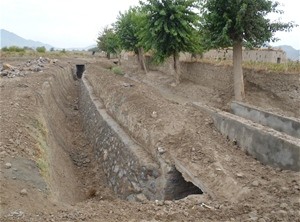
This canal near the village of Sperwan Ghar in Kandahar Province now delivers water to local farms. More than 1,800 laborers removed silt from the canal bed to allow the water to flow unimpeded.
USAID/CDP/CADG
Three irrigation projects provided temporary employment, brought agriculture back to life, and gave a reason for local tribes to set aside their differences
21 MARCH 2012 | KANDAHAR, AFGHANISTAN
CHALLENGE Panjwai District, located west of Kandahar City, is a rural area that relies heavily on agriculture to sustain its economy. During the preceding three decades, its irrigation system had fallen into disrepair. The municipality lacked the resources to address Panjwai’s infrastructural development, including its canals. Worse, intense insurgent activity coupled with feuding local tribes prevented significant infrastructural improvements in the district.
INITIATIVE Working in close collaboration with local leaders in Panjwai District, USAID implemented three projects that focused on irrigation infrastructure. Rehabilitating 24 km irrigation canals, nearly 2 km drainage canals, 53 culverts, and flood protection infrastructure would considerably improve local residents’ chances for successful farming and ensure a better outlook for the future.
RESULTS More than 3,300 laborers were temporarily employed, creating more than 71,000 person-days of labor. Approximately 20,000 district residents benefited from the three projects. Moreover, formerly non-productive farmland has been reclaimed in the agricultural district.
It was crucial for the success of the projects that local tribes overcame years of disagreements to achieve a common goal. “For many years we argued about land and water,” said a village leader. “Now we understand that we can help each other if we work together,” he added. While the project provided a short-term stimulus to the local economy through wages paid, the rehabilitation of the irrigation system will give farmers a long-term solution to improve crop yields.
USAID-funded projects implemented by Central Asia Development Group have enabled Panjwai residents to rebuild their irrigation systems, benefiting everyone. More importantly, the projects have demonstrated that rival tribes can overcome their differences and conduct development work for the common good.







Comment
Make a general inquiry or suggest an improvement.